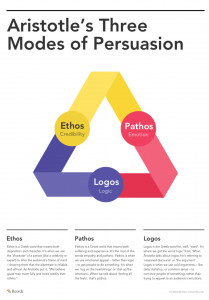I’ve criss-crossed the world sharing stories about the wonders of agriculture, and I love doing this so the industry becomes better understood overall. You can readily persuade someone who trusts you by appealing to them with a convincing argument, backed up with solid facts, and accessing the emotions of the reader/listener. I do my best to build trust by bringing the farm to my audience through the lens of an earnest learner. Consumers need to be aware of those that have an agenda that isn’t quite on the “up and up.”
Many in agriculture convey messages to the public about the industry that are true … but also a bit scary at times to the general public (i.e. food supply is low, hunger is increasing, etc.). Agriculture has a lot of uncertainty to it as an industry, but these types of messages are designed for awareness and to prepare people, not scare them.
Activist groups and groups disguised as “authorities” on agricultural issues often use manipulative persuasive fear appeals in ways that impacts many segments of the agricultural industry negatively. This hits the bottom line of hard-working producers, and I shake my head wondering why these groups want to bite the hand that feeds them!
Recently, I wrote about these types of fear tactics used by Only Organic (an activist organization that shares an office floor in Washington with the Environmental Working Group and is funded by corporations in the organic food industry), which is doing a big fear-mongering campaign against conventional agriculture called “Skip the Chemicals.”
Their fear tactics had Facebook lit up by encouraging consumers to only buy organic, deleting comments that disagreed with their points, and ignoring fairly common scientific facts easily found with a Google search! Their “FAQs” page is riddled with misleading information and makes me sad for consumers who are duped by their website.
These sort of lies and manipulation to the public can only last so long before trust is broken and backfires on their tactics, as well as on the industry overall.
We often have to fight fire with fire in agriculture, but without turning to the “dark side” of unethical tactics used by some groups.
Food production is a public industry — under a lot of scrutiny and regulation — so transparency comes with the territory. Agriculture is getting better at using persuasive methodologies (Aristotle’s three modes of persuasion — ethos, pathos and logos) to share information with the public in a more meaningful way.

Esteemed science communicator and University of Florida professor Kevin M. Folta talks about these three pillars of communication often.
“The approach needs to be more all-encompassing, starting with the ethos, and then later in the relationship showing how pathos and logos fit into the picture of what we’re hoping to communicate,” Folta says. “People such as the Food Babe and Dr. Oz have long employed far more aggressive tactics to turn people against modern farming practices. With our own arsenal of honesty and trust and ethics, that tide can one day again be turned.”
It’s true. We must build trust through feelings and common ground, connect on shared values, logic, personal experience, and more. That’s when facts are much more readily accepted.
Science communication is so important, and we must go to the source, stop the fear-based marketing and raise awareness on why it’s out there, and check out popular hashtags that debunk these myths like #factsnotfear.
I am but one small piece of this effort, but I am driven to make a difference! The blogs, podcasts and social media sites run by growers and influencers all over the country are relaying personal stories and facts supported by verifiable data, improving transparency, and increasing two-way interaction directly with consumers.
We know science and technology can be complex and confusing — and even a bit scary — so we tend to stick to our comfort zones and echo chambers. However, we all need to do our homework by evaluating sources for credibility, asking good questions, and hearing out those that have answers, not just listening to those who scream the loudest or scare us.
Are you with me?
Michelle Miller, the Farm Babe, is a farmer, public speaker and writer who has worked for years with row crops, beef cattle, and sheep. She believes education is key in bridging the gap between farmers and consumers.



